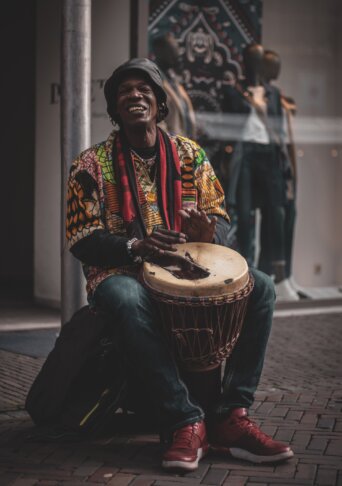- About
- Topics
- Picks
- Audio
- Story
- In-Depth
- Opinion
- News
- Donate
- Signup for our newsletterOur Editors' Best Picks.Send
Read, Debate: Engage.
| topic: | Peace and Reconciliation |
|---|---|
| located: | Nigeria, Burkina Faso, Rwanda, Sudan |
| editor: | Bob Koigi |
As the world grapples with unprecedented security threats, the international community has devised innovative strategies and approaches to ensure stability with a dedicated focus on preventing conflict rather than tackling it after it begins.
From the community level to the global space, culture is becoming a strong agent of peace and security, with art forms like music and film earning credits for their pacifying and unifying roles during times of war. These cultural gems have mediated conflicts, fostered dialogues, acted as early warning and prevention tools, given a voice to the voiceless and marginalised, spoken truth to power and advocated for strengthening the social fabric among communities irrespective of plurality of opinions and beliefs.
From the Siege of Sarajevo, where the screening of films from the Edinburgh Film Festival gave the artistic community at Sarajevo hope that the world had not forgotten them, to the reopening of Kirkuk Museum after the US invasion of Iraq that brought the communities together under a shared heritage while thawing tensions, or the use of songs in Uganda calling for former fighters and combatants not to be victimised which was hailed for stopping decades of conflict, the power and appeal of art, film and music continues to be felt before, during and after conflict.
One of the cultural ceremonies that has kept the Rwandan people together and played a crucial part in healing communities from the trauma of the 1994 genocide is Kwibuka, an annual 100 days ceremony that commemorates the darkest days of the East African nation’s history. During this period, arts and culture take centre stage as citizens mourn those they lost and commit to never repeating the dreadful act of hatred again.
In Sudan, a country that has experienced one of the bloodiest civil wars, a group of young people has chosen music over guns. Dubbed The Al-mashish Theatre Troupe, the group of self-taught actors, singers and dancers has been championing for peaceful co-existence through street theatre with performances taking place in refugee camps and markets in South Darfur and winning more people to their cause.
The intermittent conflicts in Liberia have not dampened the spirits of the communities to foster peace through culture. Through the Reel Peace initiative, women in each county are selected to be trained in film making with each team producing a video they feel requires society’s attention. The videos are then shared in film festivals and showcased to wider audiences, especially if they touch on peace, stability and inclusion.
And the recently concluded 28th edition of the Ouagadougou Film and Television Festival (FESPACO) in Burkina Faso couldn’t have come at an opportune time. There has been increasing security tension between Burkina Faso and Mali as more than 70 soldiers have been killed after an ambush on a military convoy where Islamic State Group claimed responsibility. The troubled area has seen thousands killed and close to two million people displaced over the years.
FESPACO, one of Africa’s biggest film festivals that recognises African film makers while screening hundreds of African films, has over the years rewarded film makers from conflict zones who are keen and bold to tell their stories of resilience and hope.
While these cultural tools may not be the ultimate panacea for global peace and stability, they are shaping how communities, combatants and victims interpret and heal from war and they should therefore be supported as key agents of world peace.
Image by Sam te Kiefte

